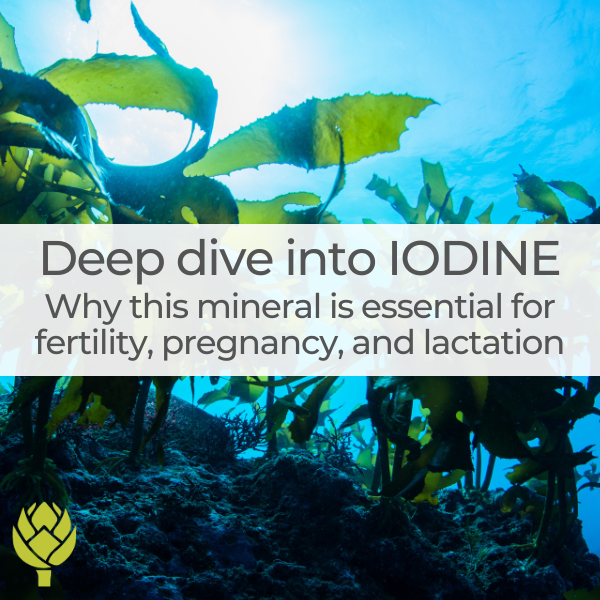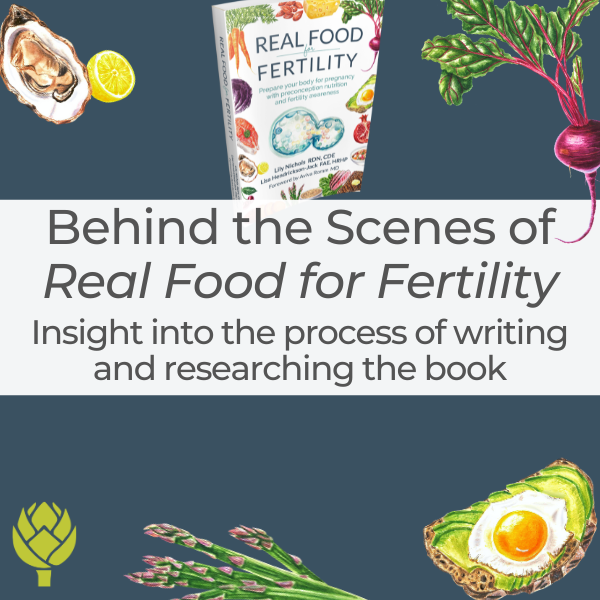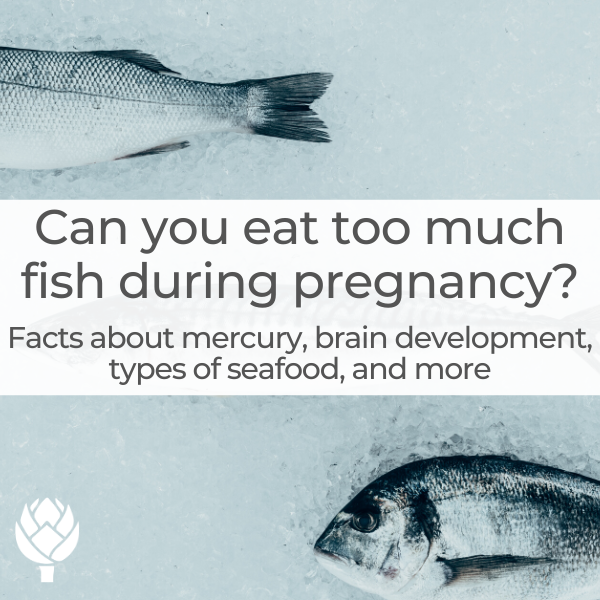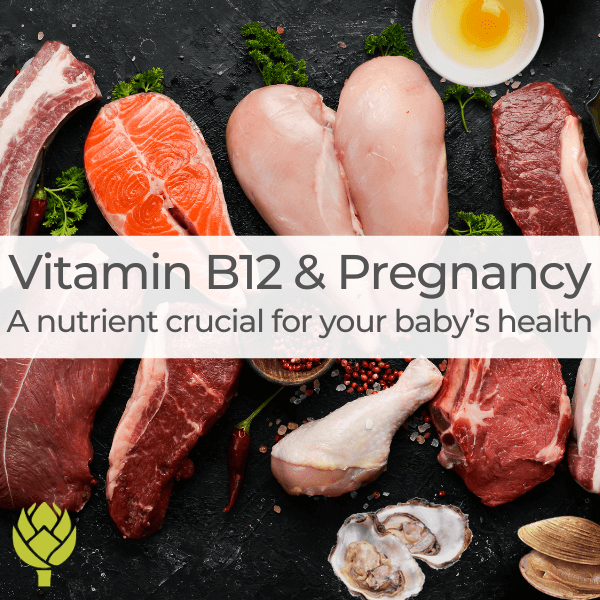Oh, the woes of pregnancy! Heartburn and acid reflux can occur at any point during pregnancy, but they most often show up in the second and third trimesters. If you are experiencing these symptoms, you may feel a burning-like sensation behind the breastbone, in the upper chest, or the throat.
In this article, we’ll cover why pregnancy can trigger heartburn, why antacids aren’t the best solution, and tips to reduce heartburn and acid reflux in pregnancy.
The bad news is that it’s not always entirely avoidable, but the good news is that you can probably reduce the severity of your symptoms. This article includes numerous excerpts from my book, Real Food for Pregnancy, which features a whole chapter on managing common pregnancy complaints and expectations — heartburn being one of them.
Why Pregnancy Can Cause Heartburn & Acid Reflux
Know this — it’s probably not your fault!
Pregnancy itself predisposes you to heartburn and reflux for several reasons that you can’t control:
- Your ever-growing baby is pushing up on your stomach which increases intra-abdominal pressure
- Your stomach is naturally more acidic from placental production of gastrin, a hormone that tells the stomach to pump out hydrochloric acid (stomach acid)
- The hormone progesterone increases, which relaxes the lower esophageal sphincter, causing stomach acid to more easily flow back into your esophagus
- Your intestines have slower motility due to higher progesterone (this maximizes nutrient extraction from the food you eat) and from being cramped by your baby
Given all of the above, it’s no wonder that 50-80% of women complain of heartburn at some point in their pregnancies!
Why Antacids Aren’t the Best Option for Pregnancy Heartburn
While you may be tempted to just pop an antacid, it may be a better option to avoid them completely. The acid in your stomach is actually good and necessary for several important reasons:
- To kill harmful bacteria, viruses and fungi
- To help you absorb minerals (like iron, calcium, magnesium, zinc, copper, etc.)
- To digest protein
- To enhance vitamin B12 absorption
As you can see, stomach acid is there for a reason. If you took an antacid, this would decrease the acid in your stomach, which would actually increase your chances of getting food poisoning, having digestive problems, and may potentially lead to nutrient deficiencies. Plus, some heartburn is actually a result of too little acid, not too much. Have you ever heard of the common home remedy of drinking diluted apple cider vinegar (which is acidic!) to alleviate heartburn?
Also, some of these over-the-counter antacids contain aluminum, which is a known neurotoxin that may be harmful to you and your baby. As one researcher puts it, “Over-the-counter antacids are the most important source for human aluminum exposure from a quantitative point of view. However, aluminum can act as a powerful neurological toxicant and provoke embryonic and fetal toxic effects in animals and humans after gestational exposure.”
Aluminum is known to cross the placenta, meaning the more you ingest, the greater the chances that baby will also be exposed. A 2021 study explains, “Since aluminum can penetrate the placenta during pregnancy, fetal exposure to aluminum is influenced by the maternal environment, diet and use of aluminum-containing medications.” Another review stated that “According to a number of studies here reviewed and taking into account that the gastrointestinal absorption of Al may be significantly enhanced by certain dietary constituents, it would seem advisable to avoid the consumption of high doses of Al-containing compounds during gestation and lactation.” This is a topic beyond the scope of this article, but aluminum is one of many toxins covered in chapter 10 in my book Real Food for Pregnancy. There are still a lot of unknowns about the safety of aluminum-containing antacids, so I err on the side of caution.
I know that sometimes the heartburn can be unbearable, and if you’ve exhausted all lifestyle choices, maybe the occasional use of an OTC antacid is warranted. I just want to be sure you’ve actually tried those first, as many are not aware that lifestyle choices can make any difference in heartburn. If you are able to find one, seek out an antacid that is free of aluminum. The old home remedy of a little baking soda dissolved in water may come in handy in a pinch.
Lifestyle changes are actually the first-choice therapy for pregnancy-related heartburn because they are often effective and have no risks.
Tips to Reduce Pregnancy Heartburn and Acid Reflux
Let’s discuss some of these lifestyle changes that will hopefully help keep the heartburn at bay, or at least make it more manageable.
Avoid large portions of foods/drinks: Eating too much food or drinking too much liquid in one sitting can result in stomach distention, a known heartburn trigger. Instead, choose small meals and snacks rather than big portions. Eat just enough food to satisfy your appetite, so your stomach isn’t over-filled. The Hunger Awareness Exercise is really helpful for this! Many find that switching to multiple smaller snacks/mini meals (often 4-6) works better than “three square meals” during pregnancy for this reason.
Enjoy beverages separate from meals: Try to avoid drinking large amounts of water during meals and instead, sip on liquids throughout the day. Too much liquid at meal times not only results in stomach distension, but it can dilute stomach acid, forcing your body to compensate by producing even more acid, all of which can lead to acid reflux. Try the following instead of having large beverages at the same time as your food:
- When you sit down to a meal, serve yourself a small glass of water – just enough to wash down whatever you’re eating (~4-6 ounces).
- If you’re at a restaurant, order water instead of a drink. If you pay for a drink, you’ll be compelled to finish it. Save the fancy drinks for another time!
- Aim to drink most of your liquids separate from meal time (at least 30 min before or 1 hour after your meals). You’ll be surprised how much better it feels.
- Add a squeeze of fresh lemon or apple cider vinegar to your water. Sour foods stimulate the release of digestive juices. This is a good thing as long as your stomach is not overly full (caution that for some people, acidic foods can be a heartburn trigger; it’s a fine balance!).
Watch the carbs & moderate your blood sugar: High blood sugar is known to relax the esophageal sphincter, increasing the chances that the contents of your stomach will not stay where they should. The more carbohydrates you eat — especially processed ones (think ‘white’ foods like white rice, white bread, white flour….etc.) — the higher your blood sugar levels, and the higher your chances of heartburn/reflux. To avoid high blood sugar, consider the following:
- Pay attention to the composition of your meals. If your meals are centered around a large portion of carbohydrates but don’t have much protein or fat, there’s a good chance your blood sugar will spike after the meal. See the “plate method” in Ch 2 of Real Food for Pregnancy for balancing a plate to avoid this phenomenon.
- Focus on the quality of carbohydrates and choose the least processed options, such as sweet potatoes in lieu of pasta.
- Some women thrive on a lower-carbohydrate diet, and if that’s you, know that a lower-carbohydrate diet has been found to be clinically effective for managing heartburn and reflux (likely because this dietary pattern minimizes blood sugar spikes). Play around with titrating your carbohydrate level up or down at meals to find your sweet spot.
Don’t eat dinner too late: If you find that you mostly experience heartburn at night, you may want to avoid eating right before bed and instead eat earlier in the evening. Some find that allowing 2 or more hours for dinner to digest before going to sleep alleviates nighttime heartburn.
Sleep with an extra pillow: If dinner timing hasn’t helped your heartburn, you can try elevating the head of your bed, if possible, such as having an extra pillow or two to prop yourself up.
Identify foods that may trigger pregnancy heartburn: Eating irritating foods is another common trigger for heartburn. The most common culprits that are likely to induce heartburn/reflux are sugary foods, spicy foods, caffeine (coffee or tea), chocolate, acidic foods (like citrus or tomatoes), dairy, gluten, low quality fats (fried food) or too much fats in one sitting. That said, every person is different so your reactions to foods may be more individual (not all of these foods may be an issue for you). This is where journaling may come in handy. Keep a detailed food diary to help narrow down which foods you suspect may be triggers.
Practice good posture: As baby grows, it will take up more and more room in your torso. This can make slouchy posture problematic for pregnancy heartburn; here’s why. Continuously sitting with your shoulders hunched and your belly compressed makes even less room for your internal organs to find space around your baby, and your poor stomach doesn’t have anywhere to go. More pressure on your stomach means it’s more likely that your stomach contents will move upward into your esophagus. Try to pay attention to your posture-sit up straight with your weight directly over your sitz bones (rather than tucking your hips under you) and imagine a string is attached to the crown of your head pulling you up ever so slightly. Believe it or not, simple posture adjustments can go a long way toward alleviating heartburn.
Consider probiotics or fermented foods (or digestive enzymes): Some people notice that probiotic supplements or fermented foods (that are naturally rich in probiotics) reduce the severity of their heartburn. It’s worth a try! Beyond the probiotics, another reason that fermented foods may work is that they are high in enzymes, which assist in digesting our food. I have yet to come across studies looking at the use of digestive enzymes for the treatment of pregnancy-related heartburn, but some women swear by them. If you’re going the food route, naturally fermented pickles, such as Bubbies brand, are a good option. For fermented vegetables to retain their probiotic bacteria and enzymes, they cannot be heat-treated (pasteurized), therefore, you’re usually looking for pickles that are found in the refrigerated section of the grocery store rather than on the shelves with other pickled items (or you can try making your own!). [Caution that some fermented foods are acidic, so while this can be a heartburn remedy for some, it can be a trigger for others. Start with a small portion.]
Try acupuncture or acupressure: In addition to all of the above, some women find relief with acupressure or acupuncture. The same acupressure point that’s used to help manage nausea, Nei Guan or P6, is effective for heartburn in some individuals. This point is located on the inner wrist.
Snacks to Reduce Pregnancy Heartburn & Acid Reflux
It may be hard to limit some of the foods you once enjoyed. Here are some snacks that you can try that may not aggravate your heartburn/reflux. Since everyone’s trigger foods are different, I can’t guarantee that all of these will work for you, but they are at least worth a try! For some women, avoiding specific foods isn’t necessary. Rather, it’s more about reducing portion size at any given meal/snack. As always, our goal is to find relief with the least restricted means possible.
- Nuts, trail mix and nut butter
- Hard boiled eggs
- Spiced banana-nut muffin (this is a grain-free recipe from my e-cookbook)
- Cut-up vegetables like cucumbers, carrots, celery, bell peppers, radishes, snap peas, etc.
- Coconut chips
- Homemade custard (see the recipe for Maple Pots de Creme in Real Food for Pregnancy)
- Non-spicy guacamole (avocado) with plantain chips or veggies for dipping
- Avocado toast (ideally on sourdough)
- Apple & thyme chicken breakfast sausages (recipe in my e-cookbook)
- Non-acidic fresh fruit, such as banana, pears, blueberries, or peaches (avoid juice as this is a guaranteed blood sugar spike!)
- Greek yogurt (if dairy is not a trigger for you)
- Wild salmon salad (recipe in my e-cookbook)
To summarize, try the following if you’re experiencing heartburn:
- Avoid taking antacids (and consider the possibility of your acid levels being too low).
- Avoid eating large portions at meals (practice mindful eating) and opt for smaller, more frequent ones.
- Sip on liquids throughout the day instead of drinking large amounts during meals.
- Be mindful of your intake of carbohydrates, especially sugar and refined (processed) carbs, to avoid blood sugar spikes.
- For nighttime heartburn, eat an earlier, smaller dinner and elevate the head of your bed.
- Keep a detailed food diary to help identify your trigger foods.
- Practice good posture.
- Consider probiotics, fermented foods, or digestive enzymes.
- Try acupressure or acupuncture.
For many of you, you might find that simple lifestyle shifts are enough to keep the heartburn at bay. Sometimes though, heartburn and reflux are unavoidable as your baby is just taking up too much room in your torso.
For heartburn that started during pregnancy, at least you can rest assured that it will most likely resolve at birth!
Until next time,
Lily
PS – Has anything in particular helped you manage your heartburn during pregnancy? If so, feel free to share what has worked for you in the comments below! Your tip just might help someone else.
References
- Richter, Joel E. “Gastroesophageal reflux disease during pregnancy.” Gastroenterology Clinics 32.1 (2003): 235-261.
- Phupong, Vorapong, et al. “Interventions for heartburn in pregnancy.” The Cochrane Library (2015).
- Tan, Eng Kien, and Eng Loy Tan. “Alterations in physiology and anatomy during pregnancy.” Best Practice & Research Clinical Obstetrics & Gynaecology 27.6 (2013): 791-802.
- Reinke, Claudia M., Jörg Breitkreutz, and Hans Leuenberger. “Aluminium in over-the-counter drugs.” Drug Safety 26.14 (2003): 1011-1025.
- Domingo, José L. “Aluminum.” Reproductive and Developmental Toxicology. Academic Press, (2011): 407-413.
- Ma, Rui, et al. “Early-life exposure to aluminum and fine motor performance in infants: a longitudinal study.” Journal of Exposure Science & Environmental Epidemiology 31.2 (2021): 248-256.
- Wu, Keng Liang, et al. “Effect of liquid meals with different volumes on gastroesophageal reflux disease.” Journal of Gastroenterology and Hepatology 29.3 (2014): 469-473.
- Zhang, Qing, et al. “Effect of hyperglycemia on triggering of transient lower esophageal sphincter relaxations.” American Journal of Physiology-Gastrointestinal and Liver Physiology 286.5 (2004): G797-G803.
- Austin, Gregory L., et al. “A very low-carbohydrate diet improves gastroesophageal reflux and its symptoms.” Digestive Diseases and Sciences 51.8 (2006): 1307-1312.
- Altomare, Annamaria, et al. “Gastroesophageal reflux disease: Update on inflammation and symptom perception.” World J Gastroenterol 19.39 (2013): 6523-8.
- Zou, Duowu, et al. “Inhibition of transient lower esophageal sphincter relaxations by electrical acupoint stimulation.” American Journal of Physiology-Gastrointestinal and Liver Physiology 289.2 (2005): G197-G201.










I managed heartburn with 0 antacids for the first time in my third pregnancy. What worked for me, besides limiting carbs, was taking a tablespoon of ACV in a small amount of water before every meal or snack, and taking papaya enzymes afterwards. Just sharing in case this can help someone else. 🙂
Surprisingly, eating watermelon was an instant fix for me!
Great article! I can confirm apple cider vinegar diluted in water works wonders for me.
Lemon water helped me a ton with acid reflux. Just a half a lemon and 16oz or more. It is slightly alkaline so it helps balance the stomach acid. I also would get heartburn at about 10pm at night so I tried to go to sleep before then.
Thanks so much for this Lily!
I started experiencing pretty intense acid reflux that made it difficult for me to sleep about 24 weeks into my pregnancy. I’ve found that sitting up straight, not lying or lounging, for a few hours after eating seems to help the most.
I used to have one of my son’s yogurt smoothies when the heartburn was unbearable. It instantly took the edge off and after a half hour or so, it helped more than any antacid ever did!
Gum has been helping me recently with the heartburn! But I’m a bit concerned that I might be chewing so much…I can go through 10 or so pieces a day. Is that too much fake sugar, etc? Would love your insight – thanks Lily! Huge fan!
I am feeling so validated to see sugary foods on your list of things to avoid. My heartburn during my last pregnancy was *directly* correlated to sugar – like more than 2 bites of anything sweet, and heartburn would rage all night. But my midwife said there is no correlation between sugar and heartburn – and all my googling couldn’t turn up anyone else saying there is, either. Post partum, I have to eat a LOT of sugar to get heartburn, but I managed it once. :/ So glad to have your trusted voice!
All of the above + papaya enzymes.
I also found that good body alignment made the most difference just be decreasing my intra abdominal pressure.
Papaya enzymes were recommended by my midwife and they literally saved my life 🙂
Drinking a small cup of almond milk almost always decreased or eliminated my heartburn when I was pregnant.
Homeopathic nat phos has been helping with my heartburn
I found that eating a handful of raw almonds slowly really helped me. Slippery elm lozenges were also helpful. Both recommended by Aviva Romm.
I found drinking milk helped last pregnancy. It seemed to sooth the heartburn though I’m not sure why. Ive also found pickles to work in the past.
Due to health issues with GERD and a previous ulcer, I have stimach issues as it is.
First pregnancy was the worst with severe acid reflux that burned my throat until the end of the pregnancy.
I did everything you listed. Complete diet and routine change, tried apple slider vinegar in case I had low acid, etc.
Nothing worked. Tums made me throw up. Only thing that somewhat helped was take zantac (that’s no longer sold) 2x/day.
Also ate almonds in hopes it would help as someone said it would. Now I have an aversion to almonds, lol.
During my last pregnancy, my husband raised the head of the bed on wooden chocks and removed the legs from the foot end. Sleeping at an angle helped significantly with overnight heartburn.
Pickled ume paste was recommended by my midwife and it really works! A teaspoon or two is all that’s needed. It’s super salty so I put it far back on my tongue and quicky swallow it without tasting it too much.
Great article.
For ladies with low stomach acid, yes, apple cider vinegar can be amazing.
However, reflux caused by high stomach acid levels is not going to benefit from ACV.
Few things I’ve learned over the years from research, clinical setting and also from others:
Histamine is key for stomach acid production. But too much histamine leads to too much acid. Thus reflux
By accident, ladies told me their reflux stopped when using either Probiota HistaminX (histamine degrading strains) or Histamine Block (DAO enzyme)
Ladies with high histamine are more prone to pregnancy complications. thus, reflux may be an early sign of trouble. https://www.sciencedirect.com/science/article/abs/pii/S0165037806000416
Nausea and vomiting is also associated with high histamine
DAO enzyme is naturally made by the placenta but may not be enough. I’m not sure if DAO enzyme genetics are exactly the same as mother. I would certainly assume so. Thus, if mom is born with slow DAO SNPs, their placenta likely has slow DAO SNPs, too. Thus, histamine can build up.
My book, Dirty Genes, has whole chapter on DAO
Best
Ben
Thanks for sharing this perspective, Dr. Lynch!
I never had heartburn a single time my first pregnancy, but had it horribly from early on my second pregnancy along with gallbladder issues. It continued until 18 months after delivery when I started learning about sodium deficiency as I was also having trouble with dizziness upon standing. When I upped my sodium my heartburn completely disappeared! I later had a hair tissue mineral analysis that showed my sodium levels were very low. I have either taken electrolytes or made my own and keep up the sodium and now almost halfway through my 3rd pregnancy with no heartburn! I think it likely has to do with low chloride left me with nothing much to make HCL with. I almost never hear this correlation but it was life changing for me.
Hey, Thankyou everyone for the tips. Yesterday I had the worst worst heartburn and next morning i changed my sitting posture and had lemon with little bit of salt in luke warm water… I think that really helped me .
So happy to hear they helped your pregnancy heartburn!